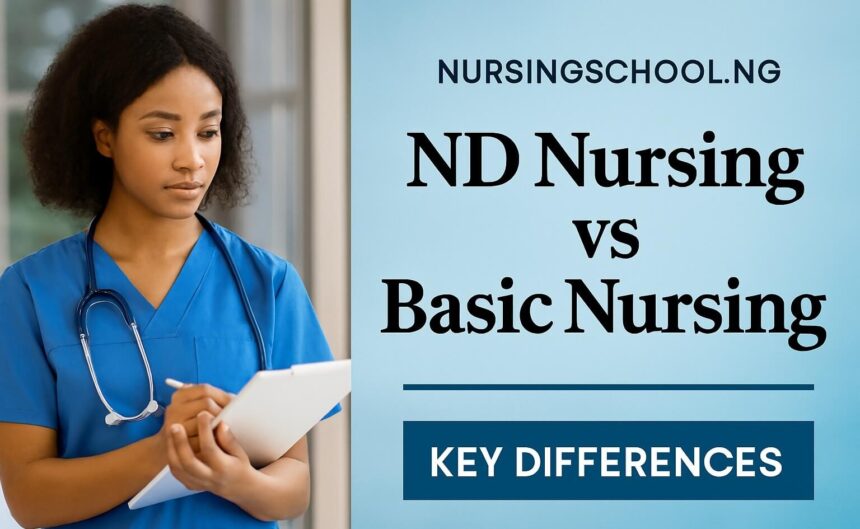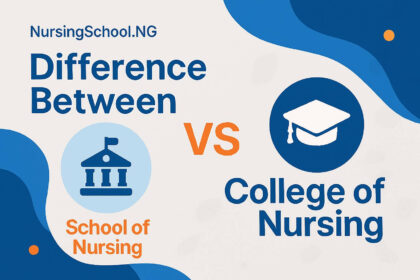Understand the difference between ND Nursing vs Basic Nursing in Nigeria. Choosing the right nursing program in Nigeria is a crucial step for anyone pursuing a career in healthcare. With the recent introduction of the National Diploma (ND) and Higher National Diploma (HND) in Nursing, many prospective students are wondering how it compares to the traditional Basic Nursing program.
This guide breaks down the key differences between ND Nursing and Basic Nursing in Nigeria, helping you make an informed decision about your future.
Differences between ND Nursing and Basic Nursing
ND Nursing and Basic Nursing differ significantly in structure, certification, and career progression. While Basic Nursing offers a 3-year training with a single professional license (RN), ND Nursing spans 4 years and provides both academic qualifications (ND/HND) and dual licenses (RN and RM or RPHN). ND graduates also qualify for internship, NYSC, and direct entry into postgraduate studies making it the future standard for nursing education in Nigeria.
Academic Certification
- Basic Nursing: Graduates receive a testimonial from their institution and a professional license from the Nursing and Midwifery Council of Nigeria (NMCN). No legally backed academic certificate is issued.
- ND/HND Nursing: Graduates are awarded legally recognized academic certificates (ND and HND) along with professional licenses from NMCN.
Program Duration
- Basic Nursing: A 3-year program combining classroom instruction and clinical practice.
- ND/HND Nursing: A continuous 4-year program—2 years for ND and 2 years for HND with no break in between.
Internship Requirement
- Basic Nursing: No internship required after graduation.
- ND/HND Nursing: Mandatory 1-year internship in a recognized healthcare facility.
NYSC Participation
- Basic Nursing: Graduates are not eligible for the National Youth Service Corps (NYSC).
- ND/HND Nursing: Graduates must complete a 1-year NYSC program, enhancing employability and national integration.
Professional Licensing
- Basic Nursing: Issued only one license—Registered Nurse (RN).
- ND/HND Nursing: Issued two licenses—Registered Nurse (RN) and either Registered Midwife (RM) or Registered Public Health Nurse (RPHN).
Postgraduate Opportunities
- Basic Nursing: Must first obtain a Bachelor of Nursing Science (BNSc) before pursuing a Postgraduate Diploma (PGD) in Nursing.
- ND/HND Nursing: Can proceed directly to PGD in Nursing without needing a BNSc.
Future of Basic Nursing in Nigeria
The Basic Nursing program is being phased out across Nigerian institutions. It will soon be replaced entirely by the ND Nursing program, aligning nursing education with global academic standards.
Frequently Asked Questions (FAQs)
Is ND/HND Nursing better than Basic Nursing?
- Yes, ND/HND Nursing offers more academic recognition, broader career opportunities, and eligibility for NYSC and PGD programs.
Can I work as a nurse after completing Basic Nursing?
- Absolutely. You’ll be licensed as a Registered Nurse (RN) and can work in hospitals, clinics, and other healthcare settings.
Do ND/HND Nursing graduates earn more than Basic Nursing graduates?
- While salary depends on experience and location, ND/HND graduates often qualify for higher roles due to their advanced training and dual licensing.
Will Basic Nursing still be available in Nigeria?
- Not for long. The program is being phased out and replaced by ND Nursing to standardize nursing education nationwide.
Can Basic Nursing graduates upgrade to ND/HND?
- Not directly. They must pursue a BNSc before moving on to PGD or other advanced programs.
If you’re planning a career in nursing in Nigeria, understanding the difference between ND Nursing and Basic Nursing is essential. ND/HND Nursing offers a more robust academic and professional foundation, making it the preferred path for long-term career growth.
Whether you’re just starting out or considering a switch, now is the time to align your goals with the future of nursing education in Nigeria.


















